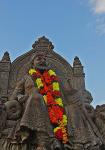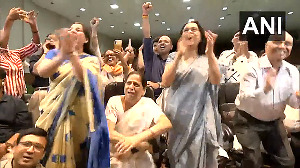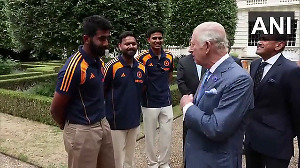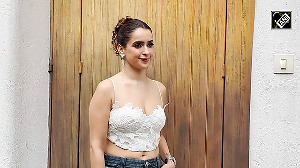"I truly enjoy what I do," she says. "And, when you do that, you never think you are doing anything special or big."
The Scholarships, named after United States President Harry S Truman, are given to college juniors across the United States who have shown promise in nonprofit work. The scholars are chosen for their leadership, academic scores and passion to bring about change through their efforts in non-private organisations.
 Singh spoke to Rediff India Abroad Managing Editor, Features, Arthur J Pais about what drives her.
Singh spoke to Rediff India Abroad Managing Editor, Features, Arthur J Pais about what drives her.
Who are some of your idols?
My mother, Hardev Kaur Singh, and father, Dalbir Singh, are the two most influential people in my life. In the face of unbelievably hard times, they remained true to themselves, their family, and god. They have guided and supported me in every possible way, and I am thankful to be their daughter. My parents have afforded me a relative life of luxury.
As an American, I enjoy freedoms that are not yet a reality for many young women throughout the world. I am the first in my family to attend college. As the youngest member of my extended family, I will be the first physician. Another idol is Dr Paul Farmer, because of his genuine care for each of his patients and his commitment to improving health policy and world health.
What do you value most in your parents?
At 20, my experiences and beliefs have instilled in me a desire to be both a physician and sewadar (public servant) and a lot of it has to do with my parents. They were raised in rural India and had a modest education, yet they are the wisest people I know.
How?
They know the importance of helping the community at large, and of course, one's own community. They also instilled values in my brother and myself that are very important to us. For one thing, they would talk about being honest for the purity of it, not because people are expecting us to be honest and upright.
What was your parents' immigration experience like?
They came to America in the 1970s from India and learned English on the job. My mother toiled in Seven-Elevens (stores), cafeterias, fast-food restaurants, and J C Penney; my father laboured as a janitor, mover, and (Washington), DC taxi driver. They each held multiple jobs both to support our family and serve the poor. My family lacked health insurance for the past five years.
Instead of enrolling in a healthcare plan, we used our extra income to assist Indian relatives and friends build homes, businesses, and a women's college. My parents have not forgotten their roots, and they have taught me to always remain connected to mine.
Why did your family not have health insurance?
In 2001, my parents borrowed funds and opened a small convenience store. At that time, my father quit driving a cab in DC, and my mom quit her retail jobs, one of which offered medical coverage. Hence, my family went without health insurance from August 2001 to March 2007.
We became four of over 47 million US citizens living without preventative care. If any of us ever got sick, we would wait as long as possible, hoping to get better; if we didn't, we would finally go to an Urgent Care and just pay with credit or cash. The whole experience taught me how broken our healthcare system really is, and that is something I would like to improve during my career.
My parents have supported relatives and their hometown in India since they immigrated to the US. They never even discussed whether they should help others or help themselves. They are the type of people that see their own blessings and put those they see as less fortunate ahead.
What do you like most about George Mason University?
I chose it because it is one of the nation's most diverse colleges. There is excellent room here for academic excellence and social work. And as I pursue my studies here, I continue to work with my parents in a convenience store. These experiences taught me to view the world through a multicultural and critical lens.
When did you start taking activism seriously?
As the only Indian American in high school (near Fairfax, Virginia), I recogniSed a need for diversity awareness but you could say it started even when I was a child, as my parents had instilled in me the idea of service.
Tell us about how 9/11 turned you into an activist.
Immediately after 9/11, images of Osama Bin Laden wearing a head wrap were repeatedly flashed across television screens. On September 15, 2001, in an act of heinous retaliation for the terrorist attacks, Frank Roque murdered Sardar Balbir Singh Sodhi in Arizona. Sikh Americans, Arab Americans, Muslim Americans, and Asian-Pacific Americans all became targets of such hate crimes because of pure ignorance and unjustifiable hate. I believe ignorance is learned, and the best way to unlearn it is through peer education, especially at a young age.
How did you go about doing it?
With a group of 20 other Forest Park High School students, I helped establish a World of Difference Institute. Through guided activities and discussions, the peer-training program allowed an open forum between students on tough issues, such as racism, and 9/11 -- topics that would have otherwise remained untouched in a classroom setting. I also organized Evenings of Culture to celebrate diversity.
As an activist, what is the biggest problem you have met?
In projects that involve opening peoples' minds and changing ingrained social beliefs, there sometimes comes a point where the situation seems hopeless, where you think what you are working on is a lost cause.
And how have you tried to overcome it?
A situation is only hopeless if you don't believe in your cause -- when you, as a leader, lose hope. I am constantly reassessing my values and making sure my activities are in line with them.
For example, last year, I almost became the founding president of the Sikh Student Association at George Mason, but it turned out that all the Sikh students I spoke with wanted the group to be dedicated to organising parties around bhangra.
What was wrong with a student group promoting bhangra?
I love bbhangra, and I am on a bhangra team, but I do not believe a Sikh Student Association, a religious organisation, should be organising parties that have little to do with increasing awareness about the faith.
In this situation, I knew I could not create the kind of club that was in line with values, so I chose to turn down the position. When my activities support my ideals, I put 100 percent into them whether there are obstacles or not.
What is the most important event or incident that you may call the turning point in your life?
In the summer of 2006, I travelled to South Africa to study the treatment of HIV with limited resources. The trip transformed the way I view the world. In South Africa, amidst all the poverty and hardships, there exists an undying desire to ameliorate poor conditions. Organisations such as The Valley Trust, Nkosi's Haven, Johannesburg Hospital, and the mothers2mothers programme have not lost hope in the face of incredible adversities.
How else was this a formative experience?
It forced me to rethink my future path. Upon returning, I decided to change my major from psychology to a subject that would allow me to think more critically about societies: Sociology, with a concentration in Inequality and Social Change.
South Africa also taught me how government policy plays a pivotal role in the health of citizens, and I plan to positively influence health through this avenue one day.
Many young people turn out as idealists but lose much of that idealism as they grow older. Have you thought about this reality? And how do you go about handling it?
Through my faith, I have so far remained true to my values in the face of all confrontations and pressures. My Sikh core guides my commitment to sewa and sarbat da bhalla (working for the common good), and with god leading me, there is no way I can go astray.
What was your Truman Scholarship interview like?
I have to admit I was nervous before I entered the room, but, surprisingly, I had a lot of fun in my interview. My panel was a group of highly acclaimed and kind people, and I felt completely comfortable. There were a couple of tough questions, but overall, I was so happy and enthusiastic to be there that I think my genuine passion for social change really shone through.
What would be a key sentence from your Truman Scholarship application?
I see connections between people who seem different, while respecting the cultural uniqueness of individuals.
What can you tell anyone preparing for the next interview by way of preparation?
If you've been invited to an interview, that in itself is a tremendous honour. After you celebrate, make sure you know your policy proposal and essays and the values and reasons behind what you have written. Also, be able to share your personal opinions about current events. Above all, don't allow nervousness to overpower the reason why you made it to the interview stage -- our passion for creating positive sustainable change.
What are the books that have influenced you most?
Mountains Beyond Mountains, by Tracy Kidder, is an inspirational and powerful text that gave me an in-depth look at the life and driving values of Dr Paul Farmer. Another favourite is the first sociological text I read, Sidewalk, by Mitchell Duneier -- a revealing and impressive ethnography on a group of homeless men living in Greenwich Village (in New York City).
What are you doing this summer?
After travelling to Missouri for the Truman Scholars Leadership Week from May 15 to May 20, I will take my MCAT (Medical College Admission Test) and help with my cousin's wedding. In June, I will study in Spain, living with a Spanish family to learn a fifth language.






